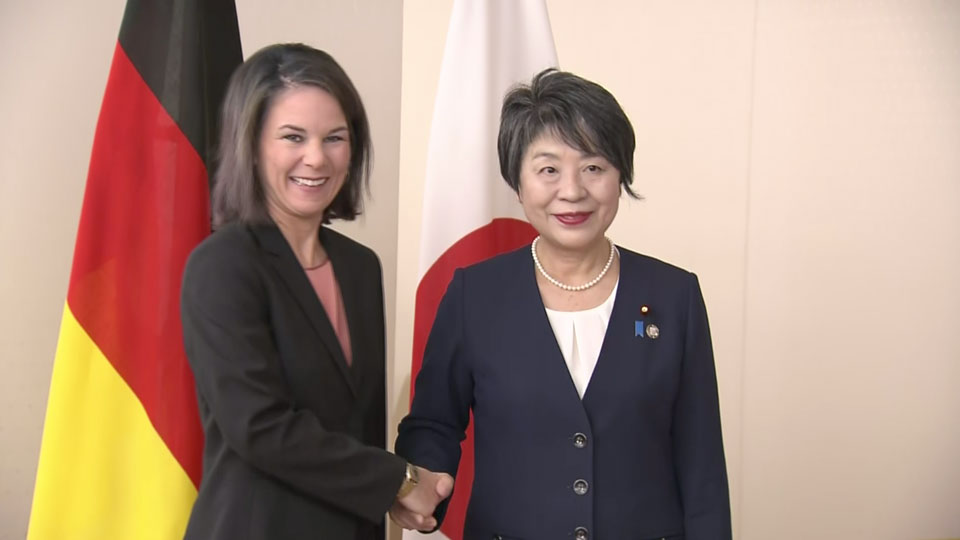Wednesday 5:00 PM
Japanese Foreign Minister Kamikawa Yoko, who chaired the meeting, held a news conference.
She said the G7 foreign ministers agreed to support a humanitarian pause in the Israel-Hamas conflict to allow aid into the Gaza Strip.
Kamikawa noted the meeting was the result of efforts made under Japan's chair to unite G7 members more than ever and work vigorously to deal with a rapidly changing international environment and growing global divisions.
She said the G7 was able to present a united message concerning the Israel-Hamas conflict for the first time and called it an important achievement.

Wednesday 3:00 PM
Foreign ministers from non-G7 countries participated online in some afternoon meetings.
In a meeting that included five Central Asian countries, including Kazakhstan and Kyrgyzstan, Japanese Foreign Minister Kamikawa Yoko noted the region is an important partner in maintaining and strengthening a free and open international order based on the rule of law.
She said Japan wants to bolster ties with Central Asian states before it holds a summit with them next year.
Ukrainian Foreign Minister Dmytro Kuleba also took part in an online meeting. Kamikawa said she wants to send a clear message to the international community that the G7 supports Ukraine even at a time when the world is focused on the Middle East.
Wednesday 1:30 PM
The ministers had a working lunch. With China and Russia in mind, they agreed to maintain and strengthen a free and open international order based on the rule of law.
They also affirmed they would oppose any attempt to unilaterally change the status quo anywhere in the world.
Wednesday 1:00 PM
The ministers concluded the morning sessions after discussing several pressing issues.
They shared views on China and the Indo-Pacific, and affirmed the importance of both the G7's involvement and expressing their concerns directly to Beijing. They also affirmed the need to work with China on global issues.
They confirmed they will continue to support Ukraine and maintain sanctions against Russia. They also agreed that the public and private sectors will work together to accelerate efforts to rebuild Ukraine in the medium and long term.
They also agreed on the need to promote the peace process with their international partners.
In addition, they strongly criticized North Korea's launch of ballistic missiles and its provision of weapons and ammunition to Russia. They also expressed the G7's support for an immediate resolution to the issue of the North's abduction of Japanese nationals.
Wednesday 11:30 AM
Japan's Chief Cabinet Secretary Matsuno Hirokazu at a news conference said he hopes the G7 foreign ministers' statement will show the group's unified stance on the Israel-Hamas conflict.
Matsuno said he wants to continue to communicate with other countries as well as international organizations, and maintain diplomatic efforts to calm the situation and improve humanitarian conditions as quickly as possible.
Wednesday 8:45 AM
Japanese Foreign Minister Kamikawa Yoko has held talks with her German counterpart Annalena Baerbock. They agreed on the need to continue providing strong support to Ukraine even with the ongoing Middle East crisis.
Kamikawa noted that ties between Japan and Germany "are closer and stronger than ever," including in the field of security. She added that she wants to even further bolster cooperation.

Baerbock said bilateral talks held in March deepened the two countries' security cooperation in the Indo-Pacific region.
The two foreign ministers also confirmed they will cooperate on issues related to North Korea, including nuclear weapons and ballistic missiles, and the North's abduction of Japanese nationals.
Tuesday 8:00 PM

The meeting began on Tuesday with a working dinner. The first item on the agenda was the Israel-Hamas conflict.
Japanese Foreign Minister Kamikawa Yoko, who is chairing the meeting, said, "As the international situation gets more severe and complicated, close communication around the G7 has never been more important."
Kamikawa said the top priorities in the Israel-Hamas conflict are securing the release of the hostages taken by Hamas and improving the Gaza Strip's dire situation. She urged the other foreign ministers to persuade the parties involved to agree to a humanitarian pause in the fighting.
She said Japan plans to provide an additional 65 million dollars in humanitarian assistance. She also stressed the need to consider Gaza's future and to revitalize the Middle East peace process, calling for more timely discussions within the G7 framework.
On Wednesday, the ministers are discussing the situations in Ukraine and the Indo-Pacific.
Kamikawa will hold a news conference after the meeting ends on Wednesday evening.
